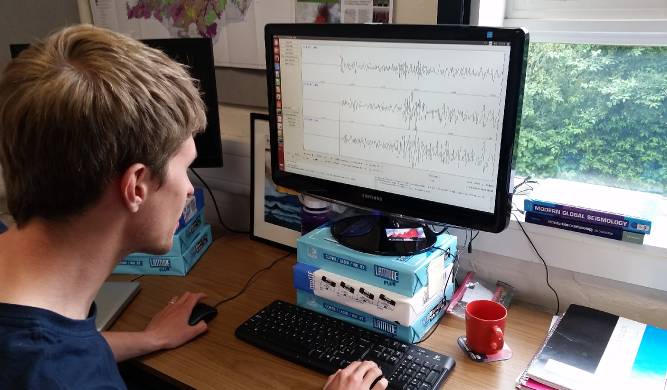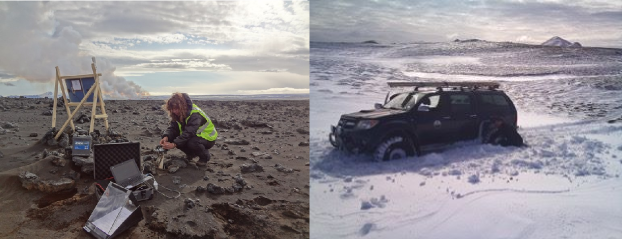What does a Volcano Seismologist do?
Volcano seismologists are usually scientific researchers that study the small earthquakes occurring in and around volcanoes to help understand how volcanoes work and where molten rock (magma) is moving underground. Others use the energy released by earthquakes (seismic waves) to image what volcanoes look like beneath the ground to try and work out where magma is being stored.
To achieve these aims, volcano seismologists use sensitive instruments called seismometers that measure the shaking of the ground and can record tiny volcanic earthquakes. A seismologist's job is then to analyse this ground motion data using modern computing methods, but they also need to go into the 'field' to visit volcanoes and set up networks of seismometers around them to record the earthquakes.

Tom Hudson selecting seismograms from a database of Icelandic earthquakes.
In the Cambridge Volcano Seismology Group, we study volcanoes in Iceland and have a network of over 60 instruments! A couple of times a year, we fly out to Iceland and drive some big 4 x 4's into the rugged, desolate interior. Here, among the black sand deserts, spiky old lava flows, snow drifts and freezing glaciers, we deploy our seismometers. They are buried in the ground and wired up to solar panels for power, with big car batteries as back-up in the winter months (when Iceland has very little sunlight).

(Left) Jenny Woods servicing a seismometer in the field. (Right) Attaching snow chains to 4 x 4 wheels.
Other research groups study volcanoes in many different places around the world, with very different styles of field work. From hot desert deployments in East Africa to mountainous Chile, and even freezing Antarctica.
Could you be a Volcano Seismologist?
Do you enjoy being in the outdoors? Do you like volcanoes and travelling to new places? Are you interested in science? Do you enjoy challenges and solving problems? Then maybe you would enjoy being a volcano seismologist!
Volcano seismologists study how seismic waves travel through the Earth, so a good physics background is really useful. Physics goes hand-in-hand with maths, so a reasonable understanding of maths is a bonus. Currently there is so much data to look at and investigate that it's really important to be able to get a computer to do it for you, rather than doing it all by hand. Being computer literate is important, but is often a skill you can pick up as you go. Equally important is a love of the outdoors and the useful practical skills needed for fieldwork, like building solar panel stands, driving 4 x 4 vehicles over lava fields and wiring up seismometers.
There is no specific route into becoming a volcano seismologists, and people come from a whole range of different backgrounds (and countries), doing different A levels and different degrees at university.
What subjects are useful?
A level: Physics, Maths, Geology/Geography, Computer science
Undergraduate degree: Geology, Geophysics, Natural Sciences, Geoinfomatics, Physics, Computer Science
Meet the Scientists
Meet a few of the volcano seismologists who helped out at the Explosive Earth Exhibit. From PhD student to lecturers, they come from a wide range of backgrounds and different countries. Check out the interviews below where we asked them how they got to where they are now, and why they think volcano seismology is such an interesting subject to study:
PhD Student: Jenny Jenkins
How did you become a volcano seismologist? For my A-levels I took Physics, Maths, and Geology. I liked them all and didn't know which subject to study at University. Then I heard about Geophysics, which gave me the chance to combine them all. So I did a degree in Geophysics at the University of Liverpool. I was so interested by all the things that we were taught about earthquakes and was amazed by how much that we still don't understand. So when I finished my undergrad degree, I decided to come to Cambridge as a PhD student and maybe help find some of the answers to the problems that we are yet to understand.
What's the most interesting place that your work has taken you? So many different places! Iceland, Hawaii, Italy, Japan, the USA, Norway... sometimes for fieldwork, and sometimes for conferences to share ideas with other scientists. One of my favourite trips was to Colorado, USA, where I worked with the United States Geological Survey (USGS) at their Earthquake Information Centre. Seeing how the USGS monitors earthquakes everyday and lets the public know about them was really interesting.
What's the best thing about what you do? Teaching and outreach. I love talking to people about what we study and all the amazing things that earthquakes can show us about our planet. It's so fascinating and often people have never heard about it before.
What's your favourite volcano? Stromboli in Italy—it has spectacular eruptions.
Post-doctoral Researcher: Dr Rob Green
How did you become a volcano seismologist? I took Sciences and Geography at school before studying Earth Sciences at University. I specialised in seismology for my final year project and then took up a position as a PhD student in the Volcano Seismology group at the University of Cambridge.
What's the most interesting place that your work has taken you? I was lucky enough to be involved in a field trip to deploy seismometers on the ice cap in central Iceland, around the large volcano Grímsvötn. The experience of living and working on the desolate ice cap was like being in a different world, and I will never forget the thrill of driving a snow scooter around the spectacular Grímsvötn caldera.
What's the best thing about what you do? I love the great outdoors, and being an Earth Scientist means that I get to spend lots of time on fieldwork, collecting data from some of the most beautiful places on the planet. When I'm not in the field, I use computers to analyse the seismic data that we have collected from volcanoes around Iceland. I enjoy the daily challenge of problem solving and the satisfaction that new discoveries bring.
What's your favourite volcano? Hekla, a large stratovolcano that stands over the densely populated lowlands in South Iceland.
Lecturer: Dr Jessica Johnson
How did you become a volcano seismologist? It sounds cheesy, but I have always known what I wanted to do. I remember being eight and doing a volcano project at school. We were acting out different roles on a volcanic island, and I was the volcanologist. Then when I was 15 (doing my GCSEs), my geography teacher approached me to say that she knew I was good at maths and physics, and loved physical geography, so had I heard about geophysics? I had not, so I read up about it and realised that it was the perfect profession for me. From that moment on, I set my goals to becoming a professional volcano geophysicist. I did maths, physics, chemistry, and geography A-levels, and studied geophysics at the University of Leeds. I went on to do a PhD in Volcano Seismology at Victoria University of Wellington in New Zealand, and had post-doctoral positions in Hawaii and Bristol, before finally securing a lectureship at UEA.
What's the most interesting place that your work has taken you? Throughout my career I have been to some amazing places such as New Zealand, Alaska, Hawaii, Sicily, Iceland, Ecuador, and the Galapagos. I think that the most interesting place that I've been was Japan. I was there for a conference and some fieldwork on a volcano on the remote southern island of Suwanosa-jima. I was lucky enough not only to hike to the top of an active andesitic volcano, which erupted explosively the next day, but also stay with some locals and experience what life is like on a small Japanese Island with a population of only 30.
What's the best thing about what you do? A very difficult question, because I would say that almost everything about my job is wonderful. I love to travel and meet new people, see new places and experience new cultures. I love getting my hands dirty in the field. I love trying to work out how volcanoes work using interesting data. I love discoveries and helping people who live near volcanoes to deal with the risks. I love teaching geophysics and volcanology to everyone from primary school children to university students, to the general public.
What's your favourite volcano? Mount Ruapehu volcano in New Zealand. I studied it for my PhD, and so spent a lot of time in the field there and learning about the volcano.
